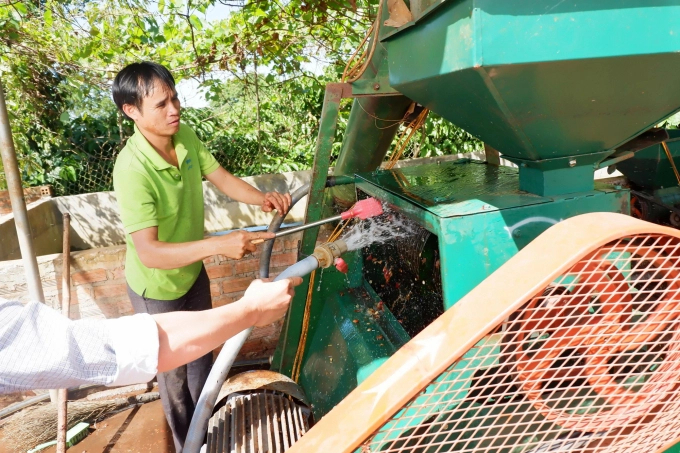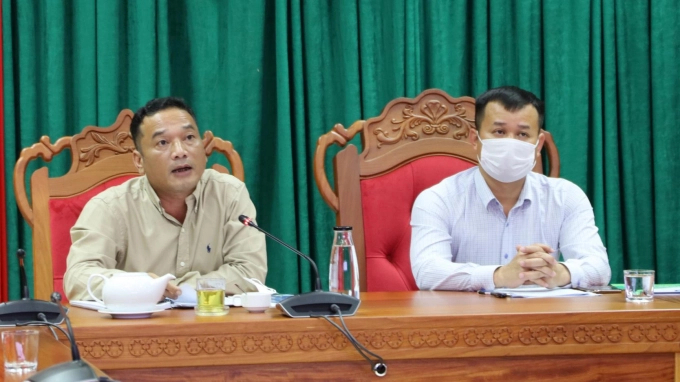May 19, 2025 | 16:53 GMT +7
May 19, 2025 | 16:53 GMT +7
Hotline: 0913.378.918
May 19, 2025 | 16:53 GMT +7
Hotline: 0913.378.918

The SourceUp Program has been deployed in Vietnam since 2018.
The event saw the participation of state agencies in 3 key countries that is Vietnam, India and Indonesia, and more than 30 businesses.
Mr. Matthew Spencer, the Global Director of the IDH Sustainable Landscape Program, stated that SourceUp is an innovative solution that enhances the multi-dimensional connection of raw material areas to the market.
Through exchanging information on the status and progress of sustainable growth, SourceUp helps improve transparency, aiding companies in accessing, making decisions, and delivering on their commitments to responsible purchasing.
Additionally, SourceUp promotes the improved production areas and raw material areas, aiming toward sustainable development through the association of public-private partners, combined with an intelligent confirmation mechanism to monitor and evaluate the real impact of the whole production area.
"The mentioned cooperation alliance and confirmation mechanism help ensure the coordination of resources, avoid overlapping activities and make good use of the advantages of each participating partner, thereby helping to harmonize agricultural farming with environmental and natural resources protection, as well as creating income for farmers according to the sustainable growth goals," Mr. Spencer shared.
The SourceUp Program has been implemented in Vietnam since 2018 and has achieved many positive impacts in 3 pilot material areas including: Krong Nang district (Dak Lak province), and Di Linh and Lac Duong districts (Lam Dong province). , on a total area of over 15,000 ha.
After nearly 4 years of implementing the program in Vietnam, SourceUp has obtained many positive results such as: increasing the income of farmers in the pilot area by 20% through crop diversification and input optimization; 15% reduction in water use and chemical fertilizers; 25% reduction in carbon emissions in coffee gardens.
Particularly, in Krong Nang district, SourceUp contributes to ensuring 100% of the output is produced sustainably and meets the market’s requirements, on an area of about 5,200 ha.
"This is a solid foundation for Dak Lak province to continue coordinating with IDH, JDE and related units to replicate the program for the coffee industry and intercropping industry on a scale of over 90,000 ha in 9 districts and towns of the province", Mr. Y Giang Gry Nie Knong, Vice Chairman of Dak Lak Provincial People's Committee emphasized.
Mr. Y Giang Gry also pledged to strengthen the coordination with IDH and its partners in constructing a favorable legal framework to promote the application of the landscape approach and SourceUp for the purpose of developing sustainable industries.

Vice Chairman of Dak Lak Provincial People's Committee, Mr. Y Giang Gry Nie Knong spoke at the Conference.
Dr. Tran Cong Thang, Director of the Institute of Policy and Strategy for Agriculture and Rural Development (MARD), said that SourceUp is a good approach, helping buyers and consumers access the growing areas and raw material areas.
Recently, the Institute of Policy and Strategy for Agriculture and Rural Development has coordinated with the Department of Crop Production to assess the situation of production organizing and use of materials and resources in the Central Highlands. Through the implementation process, the Institute remarked that SourceUp is an effective solution for pepper and coffee plants. However, the program is currently only successful on a small scale, and may face challenges when expanding to a larger scale, according to Mr. Thang.
Noting the comments, Mr. Willem Klaassens Market Manager and SourceUp IDH assessed that the program has achieved a high consensus from relating partners, at the same time, the program needs to strengthen practical application in practical production and responsible purchase, bringing practical values in terms of environmental protection, social security and economic development.
Mr. Klaassens also introduced a method of linking production through the Service Delivery Model (SDM). This is a way for farmers to access not only quality agricultural materials, but also advice on disease management and plant nutrition, preliminary processing techniques, and high-quality coffee preservation for specialty coffee and access to green finance.
"Climate change, global warming, hyper-intensive farming and irresponsible use of natural resources are major challenges to the efforts for sustainable agricultural growth", Mr. Klaassens expressed.
Accounting for more than 60% of the world's total population and 74% of the world's total farm households, Asia is considered a leading supplier of agricultural products and food. That is also the reason why IDH is interested in helping Asian countries to achieve sustainable growth goals and get rid of the "curse" of fragmentation and small, leading to economic, social and environmental consequences.
After the initial success, the SourceUp Program will be implemented in Cu Mgar district, Dak Lak province, increasing the scale of the directly invested agricultural area to over 100,000 ha.
Another good news for farmers participating in SourceUp is that from the beginning of 2021, JDE Company announced the official purchase of SourceUp coffee products from Krong Nang under the responsible purchasing program, and at the same time pressing strong orientation toward promoting investment and purchase of SourceUp products in the near future.
Translated by Hoang Duy

(VAN) Minister of Agriculture and Environment Do Duc Duy held a meeting with Soopakij Chearavanont, Chairman of C.P. Group, on May 15.
/2025/05/16/3800-0-nongnghiep-143756.jpg)
(VAN) Suntory PepsiCo Vietnam coordinated with the Ministry of Education and Training to implement an education program on water conservation, reaching nearly 1 million primary school students nationwide.

(VAN) Vietnam’s TH Group officially put its high-tech fresh milk processing plant into operation in the Russian Federation, marking a historic moment as the first TH true MILK cartons were produced in Russia.

(VAN) Use of high-quality broodstock and biotechnology is regarded as the most effective approach to ensuring sustainable and economically viable shrimp aquaculture ahead of climate change and the emergence of increasingly intricate disease patterns.

(VAN) Carbon farming is a form of agricultural practices that helps absorb more greenhouse gases than it emits, through smart management of soil, crops, and livestock.

(VAN) This is a key content of the Memorandum of Understanding recently signed between the Vietnam Fisheries Society and Kunihiro Inc of Japan.

(VAN) To achieve the goal, local authorities and businesses in Kon Tum province have fully prepared the necessary conditions for the new Ngoc Linh ginseng planting season.